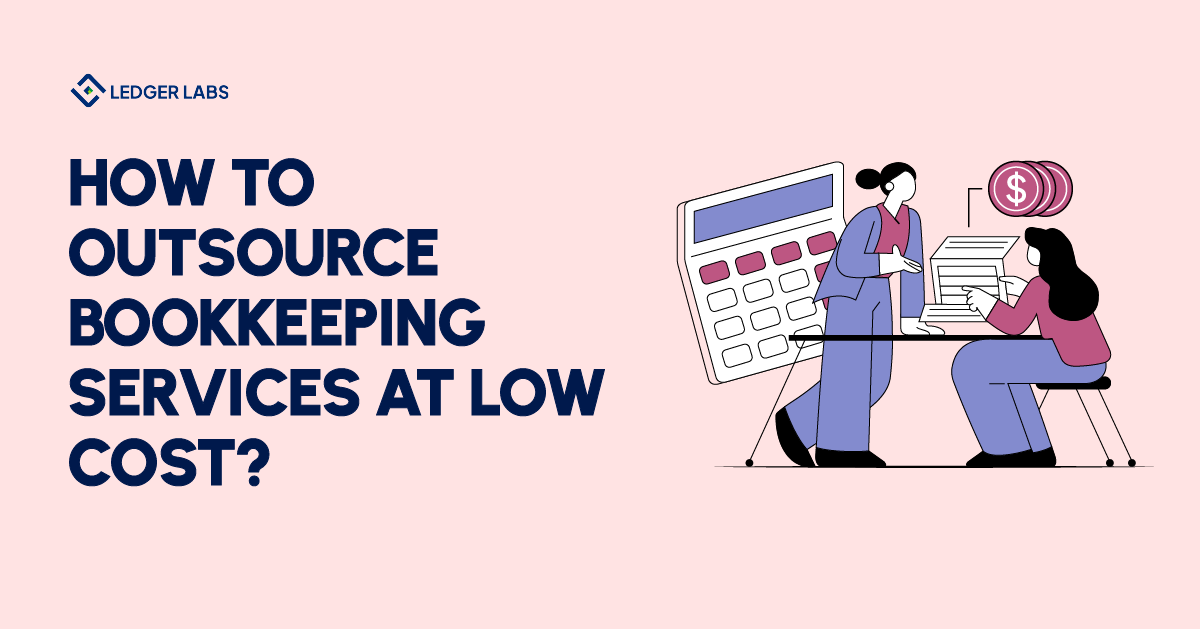Most small business owners start by handling their bookkeeping and accounting requirements themselves.
While this works out well during the initial stages of their business, it becomes overwhelmingly burdensome as time passes and the volume of data grows.
This is when they dismiss traditional accounting methods and rely on cloud technology and advanced accounting software.
It is around this time that you should consider outsourcing your bookkeeping to a reliable accounting service as it allows you to focus on nurturing and growing your business.
One of the key motivations behind this decision is its cost-effectiveness.
Imagine having a professional bookkeeper tracking and monitoring your business expenses while you have the time and mental space to focus on core business activities.
Let me help you understand what it means to outsource your bookkeeping and how it can be a cost-effective solution for your business.
- 62% of businesses outsource their bookkeeping to accounting agencies.
- 30% of SMBs fail due to poor financial management.
- Identify your bookkeeping needs before outsourcing your bookkeeping.
- The cost of in-house bookkeeping is higher than the cost of outsourced bookkeeping.
What does it mean to outsource bookkeeping?
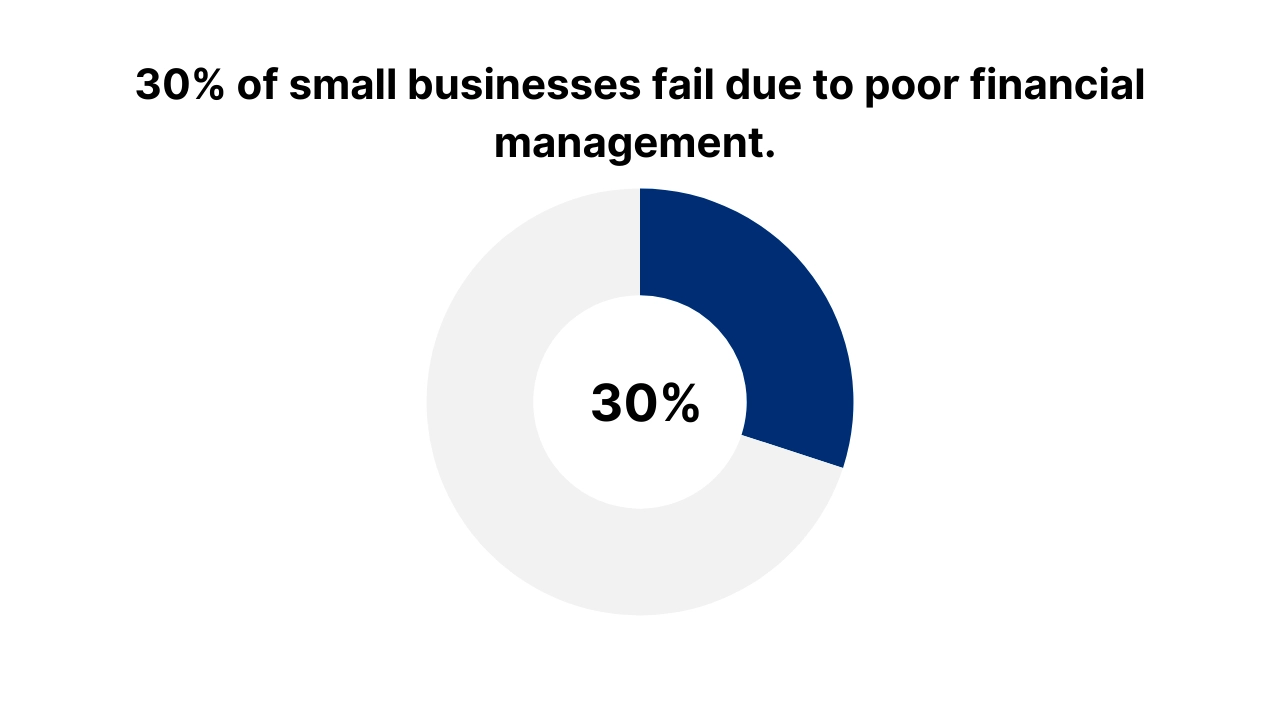
30% of small businesses fail due to poor financial management.
Regular bookkeeping is a core aspect of financial management; a task that demands your attention to detail and several hours from your day.
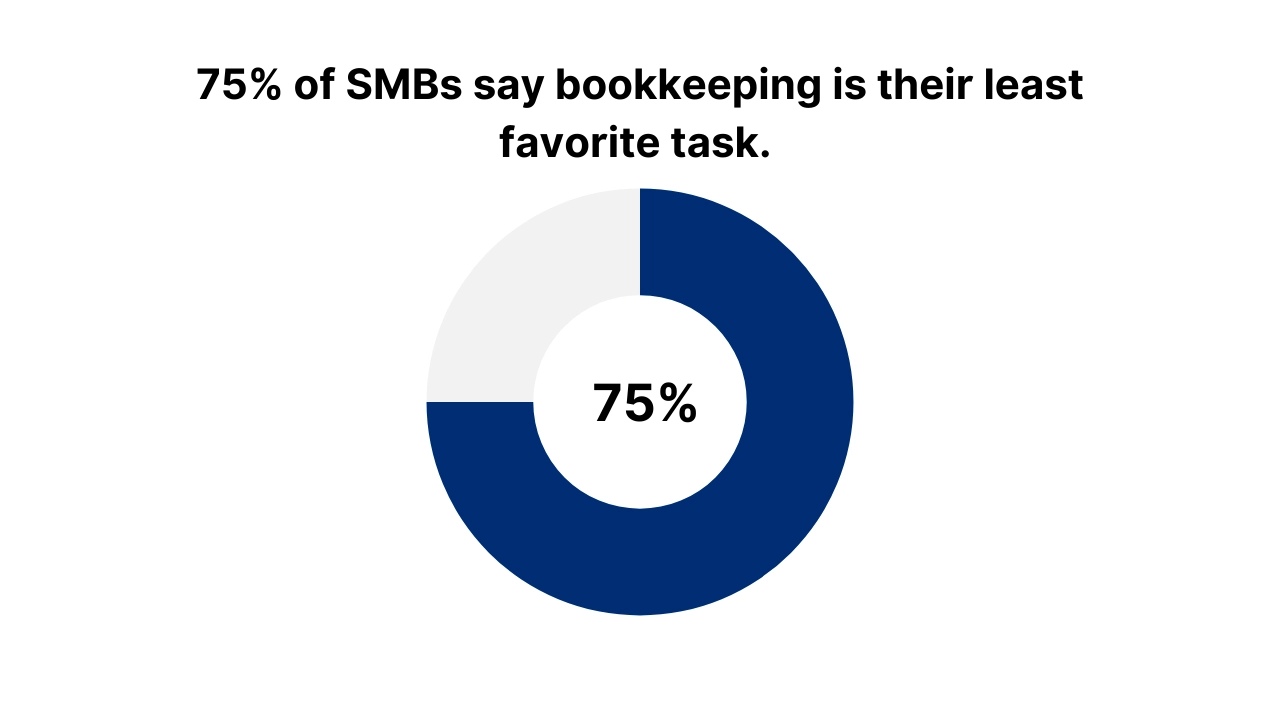
Despite having a fundamental impact, 75% of SMBs say bookkeeping is their least favorite task.
It is probably due to the fact that it requires them to do several hours of desk work, tracking cash inflows and outflows, and filling out one spreadsheet after another.
Most business owners don’t have the temperament to maintain their books regularly.
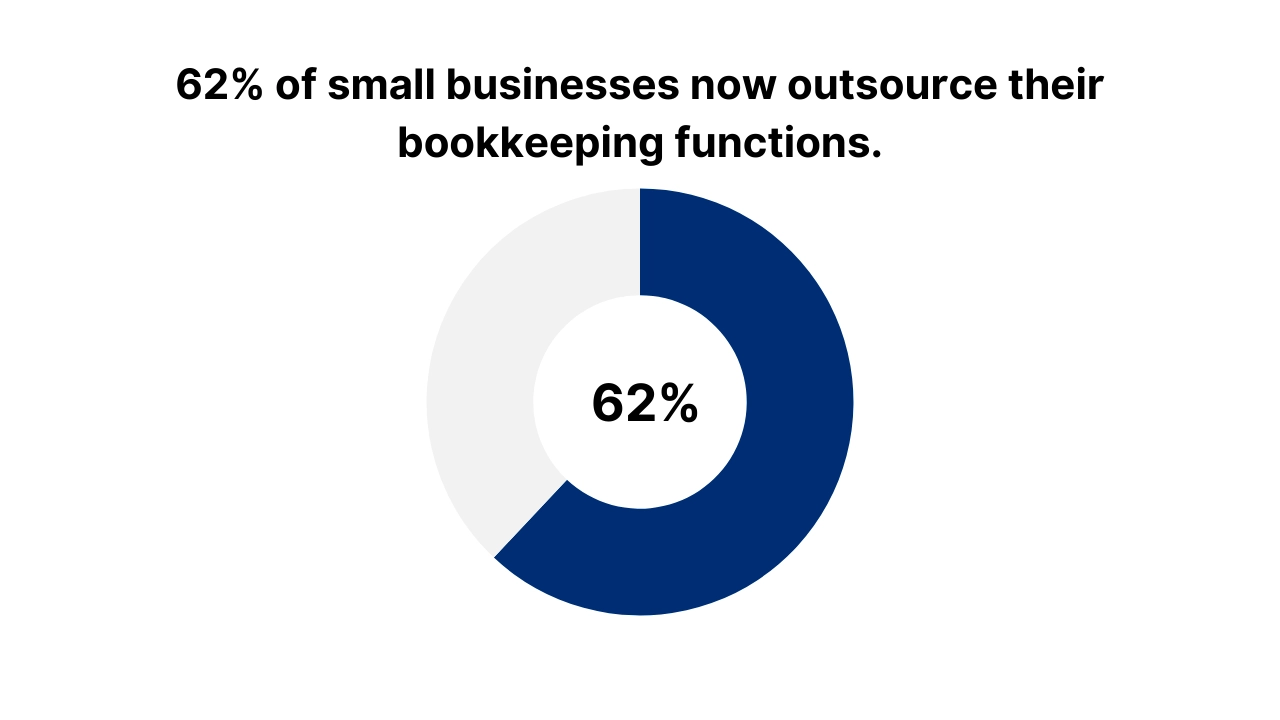
This is why 62% of small businesses now outsource their bookkeeping functions.
It helps them focus on strategizing their core business operations.
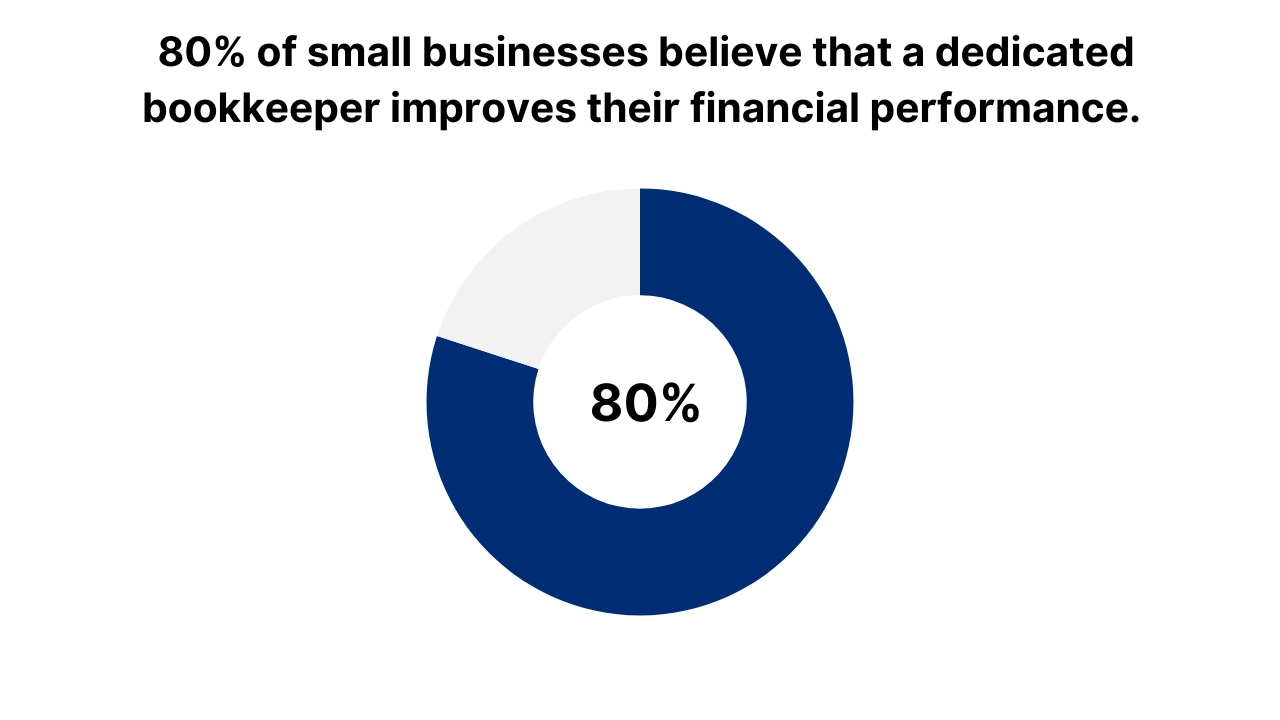
80% of small businesses believe that a dedicated bookkeeper improves their financial performance.
Hiring a dedicated bookkeeper means outsourcing your bookkeeping needs to an accounting agency.
This dedicated bookkeeper manages your financial transactions, payroll, and other key functions.
You can use this time to divert your attention to growing your business, comfortable knowing that a reliable professional is looking after your bookkeeping needs.
Beginning steps to outsource bookkeeping
Outsourcing your bookkeeping needs requires a little bit of preparation.
You cannot delegate this responsibility to just about anyone.
Also, you must figure out what exactly you need help with.
Here are the beginning steps to give you a sense of direction.
1. Identify business needs
The first step to outsourcing your bookkeeping is identifying what aspects of financial management you need help with.
Look at your current situation and analyze where you are struggling the most.
- Do you want someone to track and monitor your daily transactions?
- Do you struggle with data accuracy and data consistency due to irregular bookkeeping?
- Do you prepare poor financial reports that ultimately lead to poor decisions?
- Are you looking for cost-saving solutions?
- Do you constantly struggle with payroll management?
Once you know what type of help you need, you can look for services that cater to exactly those needs.
2. Research your options
Now you’ve got a pool of options to choose from. The only way to hire the best professional is to conduct thorough research.
Ask for peer reviews, go to online forums, and seek guidance.
Shortlist agencies.
Conduct one-on-one interviews and evaluate their technical skills with in-depth assessments.
You must choose an agency that aligns with your needs.
They should ideally have similar industry experience.
Moreover, you must outsource your accounting to an agency that specializes in the skills you are looking for.
Find out how they prefer communicating and how frequently they can sit down with you.
3. Develop a transitioning plan
Transitioning from an in-house accounting system to outsourcing your accounting takes a while.
You have to be patient and be extremely organized in your approach.
Develop a plan, jot down every step, and ensure every stakeholder is on board with you.
You should ensure all systems are updated and working fine.
Also, have backups in case of a disaster.
Make sure you train your employees and provide as much support as they need to function in the new normal.
The only thing you cannot compromise on is the security of your financial data.
Thus, implement roles and responsibilities to maintain control over accessibility.
4. Review and adjust
The transitioning period is often the most challenging as everyone is adjusting and understanding the new normal.
Focus your energy on evaluation. Determine if the performance is up to the mark.
If you face any issues, make sure you address them immediately.
Outsourced bookkeeping and in-house bookkeeping – the main difference
Now you may wonder what differentiates in-house bookkeeping from outsourced bookkeeping.
While there are several aspects, the most important one that gives outsourced accounting an edge is the cost.
Here’s how.
1. Cost of outsourced bookkeeping
Outsourcing your bookkeeping means hiring a dedicated bookkeeper to manage your basic accounting and bookkeeping needs.
There are various plans and methods of paying a bookkeeper. You can pay them per hour for their services or opt for monthly or annual plans.
An average bookkeeping service charges $20 to $50 per hour.
You only pay for the services you seek. The relationship between you and the bookkeeping agency is straightforward.
You don’t have to offer them monthly salaries, benefits, annual bonuses, etc.
It gives you financial relief as you have a dedicated source looking after your financials without expecting anything else.
2. Cost of in-house bookkeeping
Hiring an in-house bookkeeper, on the other hand, is a costly decision.
Besides their monthly salary, you must factor in other benefits such as medical insurance, travel allowance, overhead costs, and tax deductibles.
And what can be frustrating for some is that the monthly salary goes down regardless of the results.
4 services offered by outsourced bookkeeping services
Analyze your needs. This is the first step of outsourcing your bookkeeping.
With that in mind, here are the 4 popular services you can opt for.
1. Management of account payables and accounts receivables
Bookkeepers perform several tasks throughout the day, making automation a necessity.
You can seek invoice processing services to ensure your vendors receive timely payments. It also helps in cashing in on early discounts.
This process is known as account payables and receivables.
You avoid late payments and penalties and ensure all your outstanding dues are clear.
This practice improves your cash flow management, the secret ingredient for business success.
2. Bank reconciliations
An average bookkeeper spends 73.9 hours every year on bank reconciliations.
Bank reconciliation is one of the most important parts of financial management.
It keeps your financial records straight. You can say it is the link that ties your financial records with official bank statements.
Thus, you need a bookkeeping system where all financial statements are examined from start to finish.
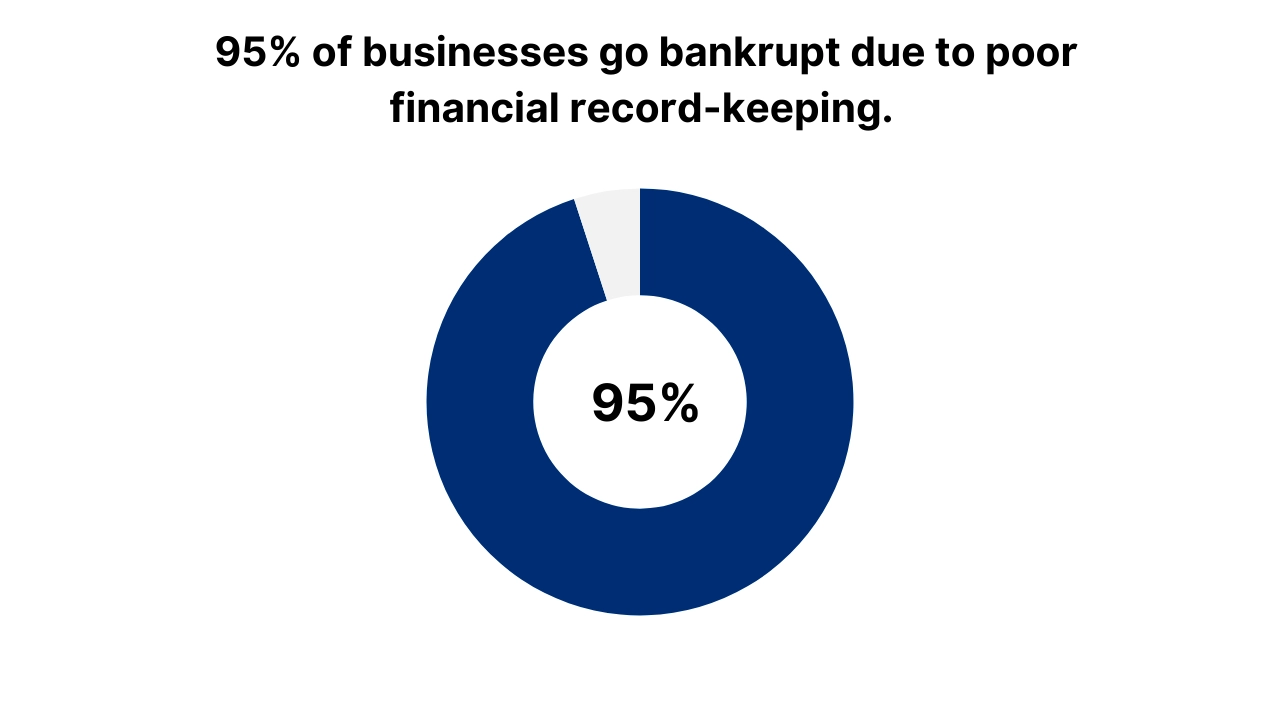
95% of businesses go bankrupt due to poor financial record-keeping.
Bank reconciliation keeps your data consistent, so you have clarity on your financial state.
3. In-depth analysis of financial statements
While it is important to have your numbers straight, you still need someone to interpret them correctly.
Bookkeepers and accountants have the education and skills to help you with that.
They can monitor your financial performance and identify various financial streams and cost-saving solutions.
They have the knowledge to identify trends and patterns in your financial reports.
Whether it is a dip in your sales or a poor conversion rate, they can help you identify areas where your business is lagging.
A bookkeeper gives meaning to your raw financial data and gives you insights to make actionable decisions.
4. Payroll processing
You can outsource your payroll management to ensure your employees get timely paid.
You can avoid inaccurate payments and minimize manual errors by outsourcing your payroll.
This decision will reduce the administrative burden on your in-house employees and give them time and space to focus on other business-specific tasks.
The main reason why businesses outsource their payroll is compliance with tax regulations.
The IRS is extremely strict with the tax laws. Thus, take as many steps as you need to reduce the likelihood of extensive IRS audits and hefty penalties.
3 reasons why you should outsource your bookkeeping
Bookkeeping is a mentally demanding job. One mistake can cost you thousands of dollars.
On average, bookkeeping errors cost small businesses $33,000 per year.
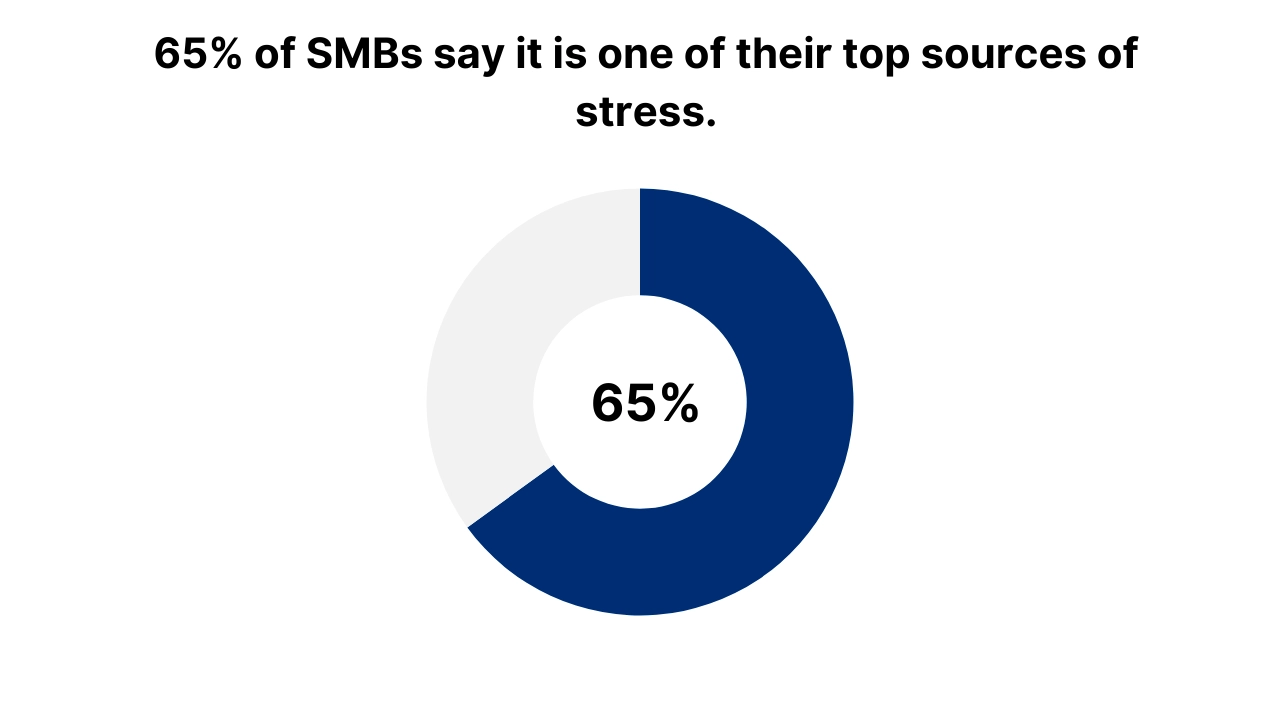
In fact, 65% of SMBs say it is one of their top sources of stress.
Businesses are now outsourcing their bookkeeping needs due to a culmination of reasons.
Here are three reasons why you should consider outsourcing your bookkeeping.
1. It is cost-effective
Hiring an in-house bookkeeper can drain a significant amount of your profit.
You are not simply paying them their salary but also for other benefits, the workspace, and much more.
Choosing to outsource your bookkeeping allows you to get all the benefits of an internal bookkeeper but at a fraction of the cost.
2. It allows you to scale properly
You run a small business, but it will eventually grow, and with that, your bookkeeping needs will grow as well.
You can’t always rely on traditional methods of accounting and expect your boat to float.
Your needs will evolve with time, compelling you to adopt new technologies or seek external help to ensure sustainability.
Outsourcing takes you one step closer to this initiative.
You will have a dedicated source managing your books without worrying about accuracy or any other problems.
3. It improves tax compliance
Bookkeeping helps you with tax preparation. If you ignore it throughout the year and only take it up during the tax season, prepare for hell to break free.
However, outsourcing your bookkeeping will ensure several things.
- Timely account reconciliations
- Accurate financial statements and records
- Data consistencies
Outsource your bookkeeping, to avoid legal audits, and instead, benefit from various tax deductions.
The bottom line
The cost of in-house bookkeeping is higher than outsourced bookkeeping.
Outsource your bookkeeping and get support with payroll management, bank reconciliation, and financial reporting and interpretation.
It is a contemporary method that gives you room for scalability and ensures tax compliance.
It is important to outsource your bookkeeping to a reliable service provider.
We at Ledger Labs have 12+ years of experience, helping businesses with financial record-keeping and other bookkeeping requirements.
We offer services to businesses of all sizes and across all major industries.
Book a consultation call and let’s talk about how you can minimize the spending of your bookkeeping and accounting.


